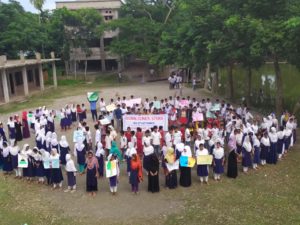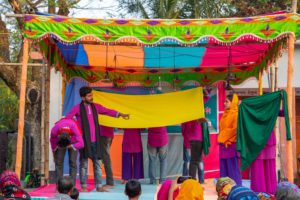Youth Advisory Boards and Youth Hubs in Bangladesh
A Youth Advisor Board (YAB) is a youth-led approach that helps youth develop their skills and capacity to influence an enabling environment for young people. In Bangladesh, YABs are connected to Youth Hubs that offer services, business opportunities, and more. This can help members of YABs and other youth groups enter the market with greater confidence and ability.
Core to the YABs are:

- Democratic management: During the formation of youth groups, there is a voting process where targeted youth elect their committee members. They also elect a coordinator who facilitates activity plans. Decisions are also taken according to the majority opinion.
- Inclusiveness and diversity: Throughout the project, inclusiveness is a core value. Youth are coming from a variety of backgrounds and social classes. Their family conditions are also improving financially in many cases.
- Multi-stakeholder engagement: The youth groups engage with multilevel stakeholders like community members and local and national duty bearers for implementing their initiatives (e.g. making bamboo bridges, tree plantation etc). The youth groups also established relationships with national government representatives.
How are the YABs and Youth Hubs connected?
In order to create economic opportunities, youth members of YABs and other youth groups have set up six Youth Hubs. These are physical spaces that promote and serve youth businesses, social action, and youth empowerment. The Hubs are located in Khulna, Rangpur, Barisal and Rajshahi, and have two key functions:

- A platform for youth-centric businesses: The Hubs provide a space for potential youth entrepreneurs to develop business ideas, market their products, and have access to the market. The Hubs also provide legal support to entrepreneurs and attract investment in order to create access to finance for entrepreneurs. Computers at the Hubs help youth sell their products online to a wider market. This opportunity is especially promising to young women, allowing them to gain income without having to travel far to sell their products.
- A platform for social action and empowerment: The Hubs are a safe and free space that offer mutual learning and sharing among young people. It is also a platform for organizing different trainings, such as on life skills. Youth groups can also use the hubs to plan, design and organize campaigns on social issues that matter to them. Additionally, services like ICT allow young people to search and apply for jobs through online job portals, with an aim of promoting digitization and digital literacy among young people in rural Bangladesh. Computer support is also given for online-based training, COVID-19 vaccine registration, government scholarship scheme applications, filling online admission forms, and more.
The youth-centric model of the Hubs was developed following the Human Centred Design (HCD) methodology. To learn more, read about the Dishari Youth Hub.
Results
- Many young people are participating in the YAB model, with the creation of 180 Ward-level groups with 3600 members, 20 Union-level Advisory Boards with 400 members, 4 District-level Youth Advisory Boards with 60 members, and one National Youth Advisory Board with 25 members.

- Among the youth groups, 13 have registered under government regulation and become formal youth organizations. These 13 registered youth groups are generating income through their business models in the current six youth hubs. They are turning into saving groups and will be supported by external funds, aiming for larger scale income-generating activities.
- Three registered youth groups from Rangpur received funding from the government based on their proposal for livestock rearing and development.
- Youth groups have taken many social action initiatives. They have taken collective action in terms of responding to disasters (cyclones Fani, Bulbul, and Amphan, as well as the COVID-19 pandemic). They also plan influencing activities to make local and national government and duty bearers accountable for providing services, as well as acting as peer educators for life skills training.
- Campaigns have been arranged on different social issues like violence against women and women’s rights, and through methods including awareness-raising by street or backyard theatre, cycle rallies, and more. Additionally, youth plant trees in their localities out of environmental concern. In these campaigns, they write different slogans and messages on placards to raise awareness of alarming issues in their communities.
Lessons learned
- A youth-led approach is the key for sustaining this model. Youth groups must have a management committee, their own savings and bank account, active citizenship, and make their own plans for income-generating activities.
- At first, youth were not very focused or interested in initiating activities. But over the time, having lots of interactive meetings, trainings and awareness-raising sessions, youths became more motivated.
- Family acceptance was a big issue at first. Parents were not convinced of youth being involved in activities that had no clear monetary outcome. But when they saw the growth of youth as active citizens, job placements after training, and their emergence as entrepreneurs, their perceptions changed.
- Youths faced challenges in getting institutional support because of the weakness of local governance. The local government does not have proper guidance on youth empowerment and little budget allocations for youth development. So, youth groups together try to solve this problem through campaigns and youth budget hearings.
- As responsible active citizens, youth developed a good working relationship with local-level government and now have priority in obtaining different types of training and government services.
- Social barriers have always been challenging for youth, especially for young girls. In rural areas it is not received well that girls are campaigning, participating in group initiatives, engaging in business, participating in different trainings, or conducting trainings. But through different influencing activities, things have improved.
Sustainability and scaling
The Youth Hubs are also considered as one of the key elements for ensuring sustainability of youth groups and YABs at different tiers. This is because they offer economic opportunities for the young people, as well as being a safe space where they can learn, meet, and engage in recreational activities. The hubs are completely youth-led, ensuring their relevance for young people over time. Also, it is expected that the 13 registered organization will remain in place as they have now become independent organizations.
COVID-19 created challenges as the lockdown affected the regular interaction of members from Hub and YAB. Regular group activities were interrupted, some business went into losses, some female members got married, and some migrated from the location. When looking at the opportunities, the young people engaged with the hubs and YAB also played an important role during COVID-19 in terms of raising awareness, distributing hygiene kits, and working with local government for distributing relief. Also, they started new business opportunities like making masks, paper soap, hand sanitizers or keeping hygiene products in hub, supplying soap/disinfection materials in different shops, marketplaces, public transport, and prayer houses. These youth-led initiatives show the resilience of young people in times of crisis.
To lean more about the soft and life skills training of EYW project Click Here
